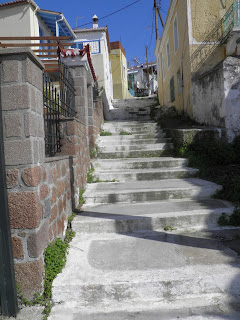'Democracy' began in the city state of ancient Athens. Adult males who had completed their military training got the vote, about 20% of the total population.
Both Plato and Aristotle saw democracy as an unjust system. They complained that equal rights meant that the far more numerous poor were able to tyranise the rich. Somehow modern man has been able to turn the tables so now the minority rich manipulate and tyranise the poor.
Women could not vote because they were not citizens of Athens. They could not vote, inherit or own land. Except in the State of Sparta they could not drink wine.
Good old 'philosopher' Aristotle believed that women were not intelligent enough to make important decisions..
Modern Greek men felt the same. The general consensus was that a woman voter would be dangerous.
...women were hysterical, illogical and unpredictable when they had their period and since the menstrual cycle of all Greek women did not coincide, 'when would the election vote be?
At the time, for many women of higher social class it was considered unladylike to vote. Prominent actress Marika Kotopoulo did not want to vote because 'voting was only for ugly women and those that did not want to bear children'.
Thank you 'greekreporter.com'
I didn't really want to get into all that but reading up on women's rights in Greece found these 'fascinating' notions and thought I might share them .
28th May 1952
is the anniversary of the day all Greek women got the right to vote and be elected to Parliament .
In 1930 they were given the right to vote but only if they were over 30 and had finished grade school (primary school I assume). Very few girls finished school back then. My mother in law went for three years but never completed her schooling. Her two sisters did one year at school and then went out to reap and sow, pick olives, make cheese and tend the livestock. Neighbour Vaso left school after two years. Mother in law was sent out to shepherd the family goats. Vaso was a child labourer in the fields and at age 10 was bringing in cash to help her family survive. She often survived she said by eating mandarins during the day and eating a bowl of beans or artichokes at home in the evening, whatever her mother had managed to put together for their family of 11.
In 1953 the first female deputy was elected to the Greek Parliament
68 women were elected in 2015
In this parliament there are 54 women. Not many out of 300.
No woman has ever been elected PM but we did have an interim female Prime Minister in 2015. She was head of a caretaker government for one month.
Greek women have come a long way. My two daughters could have grown-up to become a captain in the merchant navy, university professor, bus driver or electrician. Men and women get the same education, have the same opportunities and are mostly treated as equals.
As I have mentioned before, Vaso made sure all her children were well educated and had steady jobs. One of her daughters became a chief of police and the other a school teacher. Her granddaughters are university educated and one is now doing her doctorate at Oxford university in england. A huge change for women in two generations.
My mother in law was not so enlightened and would not let her daughter (my sister in law) continue on for high school education although the teachers tried their best to persuade her that her daughter was bright and capable of getting a good job and salary. My sister in law was sent to a seamstress so she could learn to sew and mend for the family.
No longer, as my mother-in-law believed, is a woman born only to marry, bear male children and look after the men in the family. She has her own dreams and ambitions. She is free.
Lake Ianthe
-
Yesterday we drove out on a road trip and this place is where we stopped on
the way to stretch our legs. Lake Ianthe is also known as Matahi and is
lo...
1 hour ago






















































































